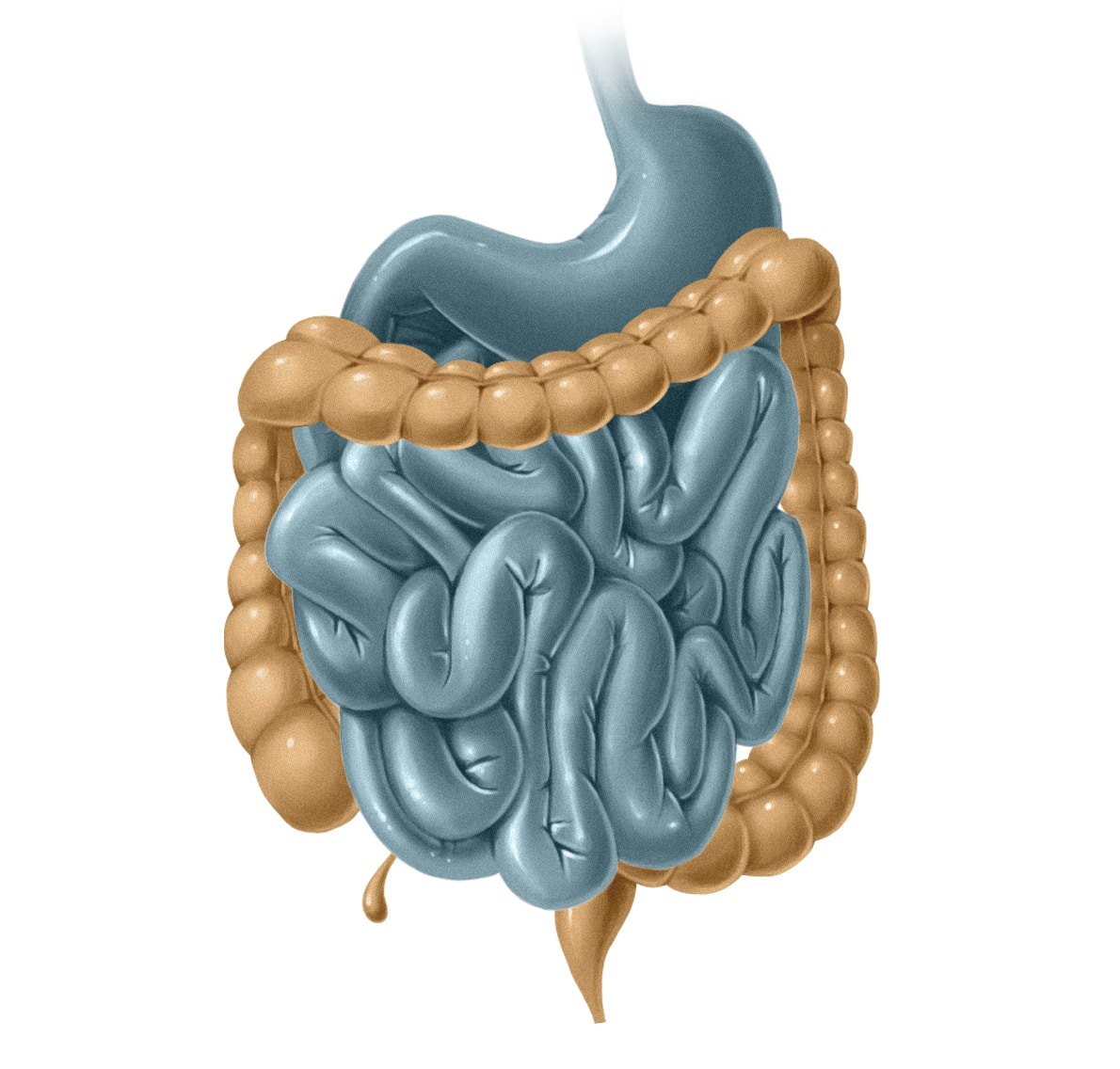The brain: it’s one of the most energy-hungry organs in your entire body, and diet has a huge effect on how well it works. Diet has an indirect effect on brain health via inflammation, gut health, and blood sugar control: all of those have serious consequences for your gray matter. And the brain also needs a lot of nutrients to do its job properly – a nutritious diet can improve everything from energy levels to brain function as you age.
Below is a lot of information about specific nutrients, but don’t miss the forest for the trees. The main point here is that eating Paleo automatically gives you a good diet for brain health, because it hits all the important points without making you think about them or track any specific nutrients.
Diet and Brain Health: The Inflammation Connection
The first way that diet affects your brain is through inflammation. Diet can turn inflammation up or down, and that has a huge effect on mental health.
Inflammation is a normal physiological response to injury or stress, but if it does on too long, it can start being a problem. It’s normal for your finger to get inflamed and red and painful after you get a splinter, but if you were constantly sticking splinters in your finger and your finger was constantly inflamed and red and painful, that would probably prevent you from holding a pen properly or doing other things that you need to do. It’s the same thing going on inside your body: inflammation starts as a symptom, but it can become a problem in its own right. (Read more about inflammation here if you’re new to this).
Diet can cause (or calm) inflammation.
- Inflammatory foods: sugar, industrial seed oils (soy oil, canola oil, etc.), soy, trans fats, gut irritants.
- Anti-inflammatory foods: vegetables, fresh fruits, fish and seafood.
Raising or lowering inflammation has a huge impact on your brain. Inflammation is associated with measurable differences in brain function. It can reduce the production of new neurons. Injecting healthy volunteers with an inflammatory substance causes their mood to get worse almost immediately and causes them to feel more socially isolated and depressed.
Inflammation is also important for serious mental illnesses. Just to cite a few studies…
- Excess inflammation may be involved in anhedonia (trouble feeling pleasure), major depressive disorder, stroke, and Alzheimer’s disease.
- This meta-analysis found that inflammation may be one reason why some people don’t respond to treatment for depression.
- This review concluded that inflammation caused by extreme psychological stressors may be the link between psychological stress and mental illness.
The link between inflammation and brain health may be particularly relevant for women, who are more vulnerable to inflammatory stress and other inflammatory diseases (like autoimmune disease).
On the flip side, anti-inflammatory drugs can help treat serious psychiatric conditions. One of the earliest medications for bipolar disorder, lithium, has anti-inflammatory effects. Anti-inflammatory drugs of various kinds have also shown some benefit for depression.
If you’re interested in specifically how that works, this is a good place to start.
The Gut and the Brain

The gut is another huge regulator for overall inflammation, and a gut-friendly diet protects your brain by reducing overall inflammation. Gut-brain communication runs along a two-way street called the vagus nerve, and whatever happens to your gut will rebound on your brain. Gut inflammation? Get ready for some brain problems.
The most dramatic case of this is the way that gut disorders often go along with brain disorders. About half of all patients with irritable bowel syndrome also have mood disorders, and antidepressant drugs are a surprisingly effective treatment for IBS.
The Gut Biome
And then there’s the gut biome – that’s the community of friendly bacteria that live in your gut. The gut biome also regulates mood and neurological function. Diets that increase gut bacterial diversity are associated with better mental health and cognitive function. Antibiotics, which wipe out the beneficial bacteria in the gut, can cause serious psychiatric effects, and raise long-term risk for depression.
Problems with the gut bacteria are also linked to serious psychiatric diseases like Major Depressive Disorder. Gut bacteria may also have an effect on brain aging and memory loss.
The short story: mental health starts in the gut. Keep your gut and your brain happy with…
- Probiotics
- Prebiotics (maybe)
- Getting enough sleep
- Effective stress management
- Regular exercise
- Avoiding gut irritants
Or check out the gut portal for even more information.
Between the inflammation and the gut connection, if you’re thinking at this point that “depression” sounds a lot less like an imbalance in brain chemistry and a lot more like a result of the modern lifestyle in perfectly normal people whose brain chemistry started off fine…well, you’re not alone.
Important Nutrients for a Healthy Brain
Totally aside from the gut, a healthy diet can also support healthy brain function just by providing enough nutrients. Your brain is a huge nutrient hog. It makes up around 2% of your body mass, but it uses about 20% of the calories you eat. It’s demanding and high-maintenance about Omega-3 fats, B vitamins, and cholesterol, and if it doesn’t get enough iron, it’s prone to throwing a hissy fit in the form of constant, dragging fatigue.
Below is a list of important nutrients for brain health, but before you read that – yes, it’s a huge list of things. The point is not to pay attention to each individual nutrient specifically. Nobody could keep up with that! The point is to eat a diet that relieves you of the need to pay attention to each individual nutrient specifically: in other words, a nutrient-dense diet full of whole foods.
Omega-3 Fats
Omega-3 fats are anti-inflammatory and important for brain health, especially at the beginning and end of life. For babies, Omega-3 fats are critical for brain development and learning. On the other end of the life spectrum, Omega-3s are important for brain health in old age. People with Alzheimer’s disease have lower levels of omega-3 fats in their brains, and dietary Omega-3s are associated with reduced risk of cognitive decline and dementia. Omega-3 fats may also help regulate the production of serotonin, an important neurotransmitter for mood.
Food sources include: fish, seafood, walnuts, and flax.
B Vitamins
B vitamins include choline, B1, B6, B9 (folate), and B12. Folate, or B9, is particularly important for pregnant women since it helps the baby’s brain and spinal cord develop. B12 is particularly important for brain function in aging.
Food sources include: basically any kind of meat or animal food, especially organ meat.
Minerals
Iron, selenium, and magnesium are three important minerals for brain health.
- Iron deficiency is one major cause of fatigue and “brain fog.” Even though many men have enough or even too much iron, many women are deficient in iron (since they lose a lot every month from menstruation).
- Magnesium is important for managing stress.
- Selenium is an antioxidant mineral that helps reduce oxidative stress and may be protective against inflammatory brain disorders.
Food sources include:
- Iron: red meat. Plant sources aren’t as good.
- Selenium: Brazil nuts, fish and seafood, shiitake mushrooms, asparagus.
- Magnesium: almonds, spinach, other nuts, avocado.
Fat & Cholesterol
These two go together because they’ve both been unfairly demonized for the past few decades, and they’re typically found in the same foods.
Fat is important for regulating mood and helping your brain respond to stress.
Cholesterol is important for making connections between brain cells – this helps you preserve brain function as you get older. It’s also critical for memory formation and learning. Nobody explains this quite as well as Chris Masterjohn, so here’s his take on the subject.
Food sources include: meat, especially red meat and organ meat, and egg yolks.
Patterns in the Food Sources
Nobody can keep track of all those nutrients, but you’ll notice some patterns in the food sources:
- Animal foods are important, especially red meat and organ meats. They’re more than protein!
- Fish and seafood are also important.
- A big variety of fruits and vegetables is the way to go: there’s no one perfect food.
Hey…sounds like Paleo!
Blood Sugar and Brain Health
One last important way that Paleo protects brain health: it helps regulate blood sugar.
High blood sugar is really bad for your brain. The extreme of high blood sugar is diabetes – people with diabetes have worse memory and lower cognitive skills, and a much faster decline in brain function as they get older. There’s a reason why Alzheimer’s disease is sometimes called “Type 3 diabetes!”
Paleo mostly helps control blood sugar by reducing refined flour and simple carbs. The result is a much more brain-friendly diet.
The ketogenic diet shows off the power of very extreme carb reduction to change brain function. A ketogenic diet is high-fat diet with almost no carbs; it basically forces a dramatic change in brain metabolism. And it’s powerful medicine for severe brain disorders. A ketogenic diet is an effective cure for treatment-resistant epilepsy in children; it also has some promise for treating Alzheimer’s disease and some other mental health problems of aging. Anecdotally, a lot of people who go on a ketogenic diet report feeling very clear-headed and alert all the time (once they’re past the initial stage of low-carb flu).
On the other hand, not everyone needs to be on a ketogenic diet; it’s very possible to have good brain health and still eat carbohydrates. The trick is to find a level of carbs that works for you.
The Myth of the “Brain-Boosting Superfood”

Blueberries. Wild-caught salmon. Walnuts. Spinach. Chia seeds.
All of these are perfectly nutritious whole foods and there’s nothing wrong with eating them. Many of them contain some nutrients that are good for brain health – blueberries and spinach have antioxidants; salmon and walnuts and chia have Omega-3 fats. But they don’t magically cure or prevent any brain diseases.
No one food is "the answer" for brain health. The important thing is to eat a basically healthy diet overall and keep your nutrition in general on track. If you’re getting plenty of antioxidants from other sources, you can take or leave blueberries in particular, and if you’re not getting enough antioxidants, blueberries are unlikely to be the savior superfood.
Back to the Main Point
In case you got a little bit lost above, the main point is that Paleo hits all the brain-health bases almost automatically. By default, it’s an anti-inflammatory diet that also supports gut healing and helps regulate blood sugar – but you don’t have to consciously try to do any of those things. And all the foods that give you those benefits are full of important nutrients for brain health, but it’s not necessary to get obsessive about counting and tracking. You get to focus on eating delicious foods (and then getting on with the rest of your life); all the other stuff can happen behind the scenes without you having to spend time and energy thinking about it.
Want more? Check out in-depth looks at…





Leave a Reply